Why Some LGBT Youths In Jamaica Are Forced To Call A Sewer Home
Young LGBT Jamaicans are chased out of their communities by family and neighbors using vigilante justice to enforce the country’s laws against homosexual conduct. Now police are trying to push them out of their shelter of last resort.
Posted originally on Buzzfeed News on December 18, 2013, at 12:07 p.m. ET
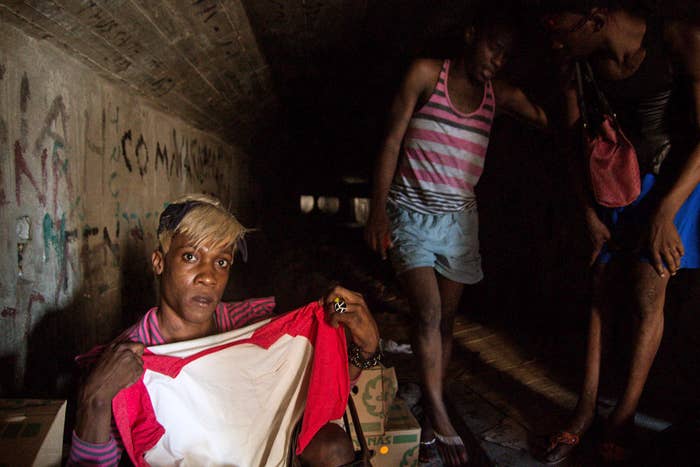
KINGSTON, Jamaica — Around 11 a.m. on Sunday, Dec. 1, police officers led by Cmdr. Christopher Murdock lowered a ladder into an open sewer in New Kingston, the Jamaican capital's financial district. The sewer, damp and strewn with trash, flowed out of the business district housing several banks, large hotels, and shopping arcades. And it was home to a group of youths Murdock wanted gone.
Their alleged crime: stealing. Murdock said he had received more than 30 reports of theft and robbery since the group, ranging in age from teens to early twenties, had moved into the sewer several months before, and he was becoming concerned that the stretch of Trafalgar Road that runs over their makeshift home was becoming unsafe for people to walk.
But Murdock's televised remarks following the Sunday raid left the impression the kids were unwanted for an entirely different reason: "The aim of this operation was to remove men of diverse sexual orientation who continue to plague the New Kingston area."
Jamaica has long been one of the most hostile countries in the Americas for LGBT people. But in recent months, the murders of LGBT people and mob attacks — including fire bombings — on the houses where they live have made headlines with increasing frequency. Activists are not entirely sure what's caused the surge in violence, though it may be due in part to the debate over possibly repealing the country's colonial-era sodomy law, an idea that Prime Minister Portia Simpson-Miller floated during her 2011 campaign. Her government has not yet taken any action on the proposal, but pro-family groups have mounted a campaign to ensure it never does.
For years, the media in Jamaica have hyped stories about the crimes of "rowdy gays," crafting a distorted image of the LGBT community at large, local activists say. Television stations have refused to run ads promoting tolerance for LGBT people — on Nov. 16, the country's Supreme Court tossed out a lawsuit challenging their decision last spring to reject an ad put together by the organization AIDS-Free World promoting tolerance for LGBT people. The ad featured a gay lawyer named Maurice Tomlinson who left Jamaica in 2012 following several death threats. Many out gay public figures have also gone into exile, while several others have been murdered in the past 15 years; the number of out gay public figures still living in the country can be counted on the fingers of one hand.
The headlines that ran the day after the sewer raid were typical: "Gay robbery suspects arrested in [New Kingston] raid," said the Jamaica Observer in a 660-word feature that focused on the youths' cross-dressing and exhaustion from "partying all night."
Even the group's advocates say the youths are not blameless: They have turned on people who have tried to help them and admitted to some criminal activity — they largely survive on prostitution. But the youths are convinced there is something else motivating the police raids against them.
"They are trying to pin something on us," said one, who gave his name as Michael. (To protect their safety, BuzzFeed is referring to them by aliases they chose themselves.) The police and the press, Michael said, were going after the group for the same reasons the group took shelter in the sewer in the first place: Homosexual conduct is against the law, and Jamaicans are willing to take enforcement into their own hands.
"Because I am gay and it's not legalized in the country, they want to get rid of us," he said.
The situation for LGBT people in Jamaica has been deteriorating since July, when a 16-year-old named Dwayne Jones was hacked to death by a mob in the northern city of Montego Bay after he was outed while dancing with a man who did not know Jones had been born male. Since then, there have been multiple incidents when mobs descended on the houses of people perceived to be gay, including a firebomb attack in October, also in the area of Montego Bay.
It wasn't always this way. "I can remember things were not this bad when I was coming up and coming out," said Lewis, who is 38 and came out to his family at 18, though he only felt safe enough to allow his face to be shown in press reports starting in 2013.
Between 2009 and 2012, the Jamaican Forum for Lesbians, All-Sexuals, and Gays (J-FLAG), the country's oldest LGBT rights group, counted 231 reports of discrimination and violence. But the worsening violence could be a response to greater visibility by LGBT people, a terrible backlash against modest progress. It has taken its toll on gay and trans youth. (For reasons LGBT activists don't entirely understand, there aren't many known cases of homeless lesbian girls.) "People are coming out younger and younger and being pushed out younger and younger," Lewis said.
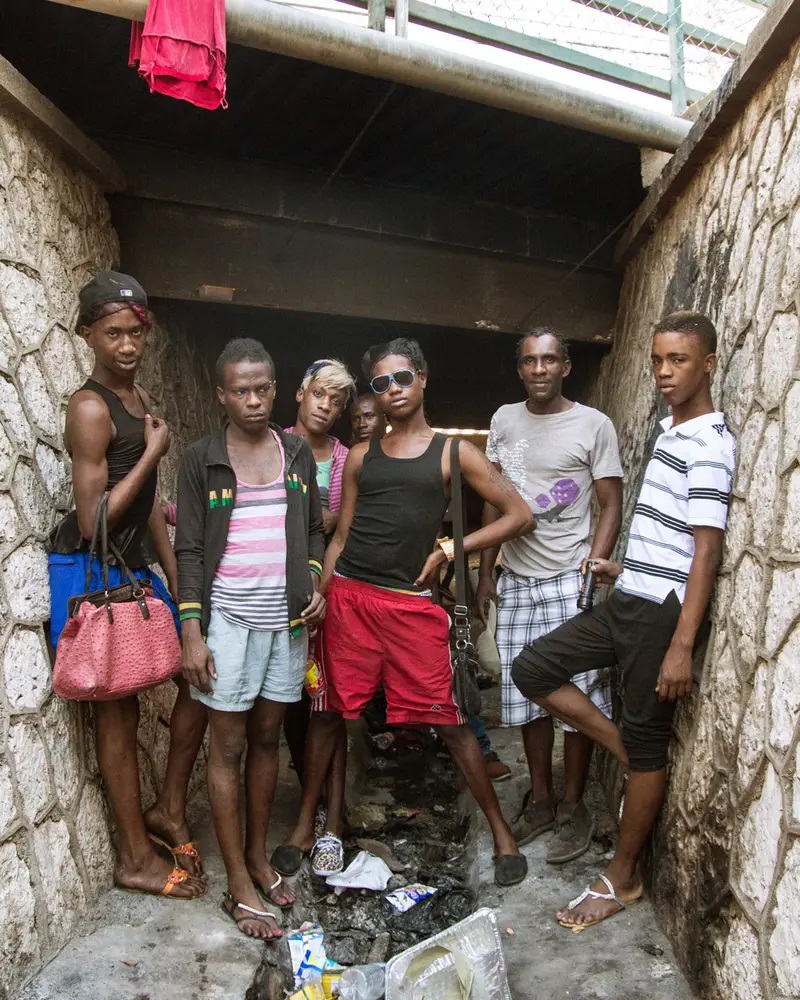
Interviews conducted with six of the youths scooped up in the sewer raid paint a scary picture. All told stories of being turned out by their families, exiled by neighbors, and assaulted by classmates or neighborhood gangs.
Michael, who has the blond hair in the photograph above taken days after the raid, left his community three years ago at age 17 after being threatened at gunpoint for being gay. To his right, straddling the ditch, is Fancy Face, who is 23. She said she left home around a year and a half ago when local papers published a picture of her cross-dressing at a party raided by police.
On the far left, holding the pink handbag, is Davel. He was the youngest of the group — 15 — when his siblings forced him out of his mother's house five years ago.
Davel now speaks with a kind of appreciation about the daily beatings his brother used to administer hoping to scare him straight: "He wasn't really beating me to damage me. He was saying, '[This] is Jamaica' … and he [was] showing me that when I get older and other guys come at me, they won't have any mercy."
Davel's story spoke to the difficulty many gay and trans teens have in finding a home in Jamaica. First he went to a "capture house," an abandoned building taken over by gay and trans squatters. Community uproar got the squatters evicted from that house, and from the next house he went to, and the next.
For a time, he had a boyfriend who took him in. But when their relationship faltered, Davel wound up on the streets. In August, he met some of the New Kingston group on Half Way Tree Road, a busy commercial district a short distance away that serves as a gathering spot for LGBT youths in the area.
They took him to the sewer, where he had to climb over a guardrail and lower himself down a 10-foot drop. The "bedroom" was the fetid tunnel running under the busy road. His first night there, he said, was "kind of horrifying."
The Dec. 1 raid — which was followed by another police visit the next day — was just the latest in what the group said has been a three-month campaign of police harassment. On the night of the raid, police burned their few possessions, including food and clothing donated by LGBT rights activists; the gray muck along the bottom of the channel were the ashes, they said. In previous raids they were pepper-sprayed, beaten with batons, and shot with metal marbles fired from slingshots, they said. Murdock denied the group had been brutalized and denied having burned their belongings.
Police are not the group's only problem. "Here in the gully anyone can climb down at any time," Davel said. "You are probably asleep and they come throw stones at your head, catch [you] on fire. Because that's what Jamaica is for and all about with homosexuals."
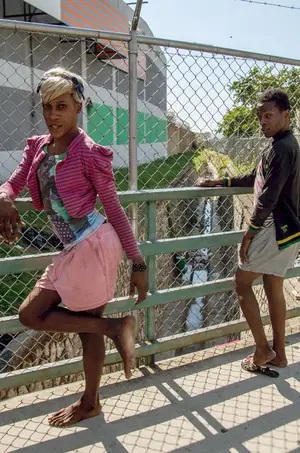
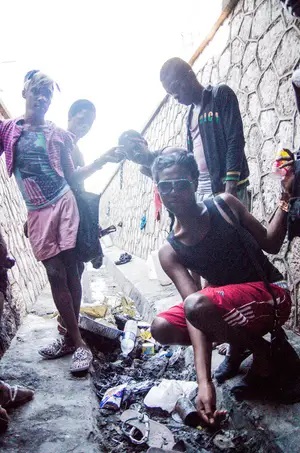
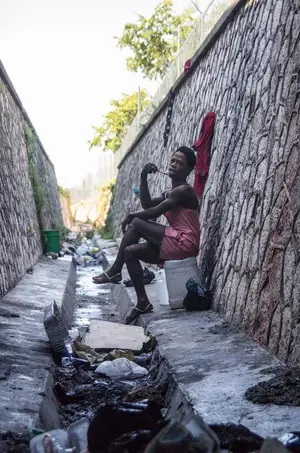
Like India and many other former colonies, Jamaica's law criminalizing same-sex intercourse is a relic of British rule. It is known locally as the "buggery law."
Justice Minister Mark Golding told BuzzFeed that a proposal to revise the code had been drafted, but not yet put to parliament — there have been too many other contentious issues already on the agenda since this government took office in 2012, he argued. Golding said he hoped to place a broader review of the country's sexual offenses law on the agenda in 2014, believing that might enable discussion of the question in a "more sober" way.
Despite the hope for reform, Golding said violence against LGBT people in Jamaica did not stem from the buggery law, but was rather a reflection of high violent crime rate overall. "It is not illegal to be gay in Jamaica," he said. "Many Jamaicans know that."
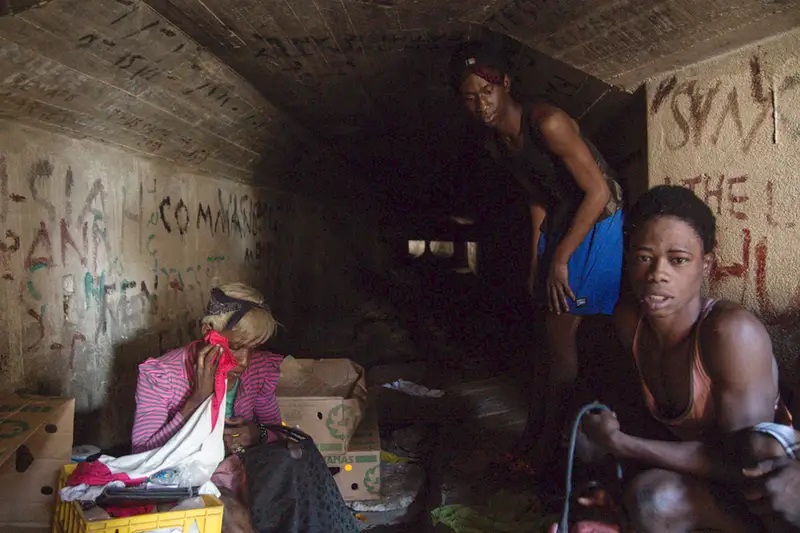
Dane Lewis, director of J-FLAG, said homeless LGBT youth face particular challenges in the country: "They're out there because their communities are not at all interested in allowing them in being part of that space. They remain out there because we have a society that says, 'Yes, they are second-class citizens and the state does not feel it needs to provide protection."
They have also posed a challenge for the Jamaican gay rights movement.
In 2009, J-FLAG collaborated with the organization Jamaica AIDS Support for Life to set up a shelter for LGBT youth a short distance from the New Kingston sewer. It housed 11 boys and one girl; all but one or two of whom were HIV positive.
The youths were difficult and scarred — nearly all were victims of physical and sexual abuse, and sometimes they lashed out. When pilot funding ran out in early 2010, the groups were forced to shut the program down and provided aid on an ad hoc basis. The problems only grew. There were altercations with staff and break-ins, and those who felt they were not getting the services they wanted sometimes threw stones at J-FLAG's building. J-FLAG provided meals a few times a week to around 30 kids, but they weren't allowed access to the bathrooms and so they defecated on the property.
When J-FLAG was forced to change location for unrelated reasons in the spring of this year, activists decided to keep their new location secret, which had "a lot to do with" not wanting the youths to find them, Lewis said. Now, he says, the youths have become their own worst enemies.
He sympathized with Murdock, the police commander, saying he "really is challenged because [the youths] have created for themselves a problem [in] the spaces that they would congregate in."
They have also created a problem for other LGBT Jamaicans, he argued. "They have eroded some of the gains that we have made towards greater tolerance," he said. "Some people automatically think — because that's the only representation that they know of gay people — that that's how the majority of gay people behave."
That attitude drew sharp criticism from Yvonne McCalla Sobers, a veteran activist: "It's a damn class thing... The [youths'] bad behavior is processed in a way that puts the blame on the youth, although the youth are not blameless."
She said that activists like Lewis, who are insulated from the threats less well-off gays face on the streets by living in gated communities and driving cars, don't fully appreciate why the youth act out.
"It's safe to assume that those who don't support themselves with prostitution support themselves with robbery, but they have to find some way to survive," she said. "They are pretty battered by the time you meet them."
McCalla Sobers is a 76-year-old former schoolteacher and founder of the anti-police brutality organization Families Against State Terrorism. She was often a representative for J-FLAG in the years when its members were too frightened to be identified as gay in the press. Now, she is helping coordinate an effort to establish a shelter for the youths living in the sewer.
The person pushing hardest for the shelter's creation is Maurice Tomlinson, who brought the lawsuit trying to get the LGBT rights ad on television. Another person who worked closely with the youths, Micheal Forbes, is now seeking asylum following periods of near-homelessness after a mob chased him from his aunt's home in the northern part of the island earlier this year. McCalla Sobers is also getting some help from a newly formed lesbian organization, Quality of Citizenship Jamaica.
They are calling the shelter Dwayne's House, in honor of the trans youth killed in Montego Bay in July, and launched a fundraising campaign this month. They estimate that it will take $150,000 to establish a shelter to house 50 youths and will cost a monthly $450 per resident to keep it running.
Until the shelter is established, however, the youths' situation grows more dire.
Ten days after the police raid, heavy rain accomplished what Murdock could not: Flooding forced the kids to flee the sewer. They have temporarily taken shelter in front of nearby businesses, keeping a constant eye out for security guards, waiting for the rain to subside.
The homeless boy calling himself Michael said, "They just want to get rid of us … but we don't have anywhere to go. We have to stay right there until something is done for us."
J. Lester Feder is a foreign correspondent for BuzzFeed and 2013 Alicia Patterson journalism fellow.